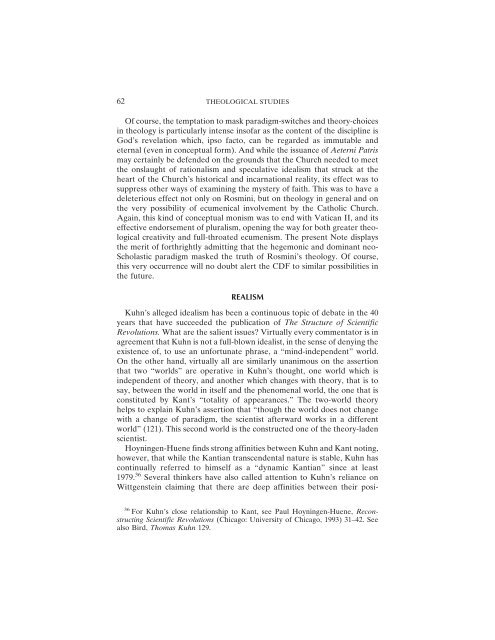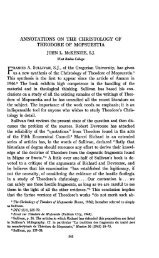rosmini, ratzinger, and kuhn - Theological Studies
rosmini, ratzinger, and kuhn - Theological Studies
rosmini, ratzinger, and kuhn - Theological Studies
You also want an ePaper? Increase the reach of your titles
YUMPU automatically turns print PDFs into web optimized ePapers that Google loves.
62 THEOLOGICAL STUDIES<br />
Of course, the temptation to mask paradigm-switches <strong>and</strong> theory-choices<br />
in theology is particularly intense insofar as the content of the discipline is<br />
God’s revelation which, ipso facto, can be regarded as immutable <strong>and</strong><br />
eternal (even in conceptual form). And while the issuance of Aeterni Patris<br />
may certainly be defended on the grounds that the Church needed to meet<br />
the onslaught of rationalism <strong>and</strong> speculative idealism that struck at the<br />
heart of the Church’s historical <strong>and</strong> incarnational reality, its effect was to<br />
suppress other ways of examining the mystery of faith. This was to have a<br />
deleterious effect not only on Rosmini, but on theology in general <strong>and</strong> on<br />
the very possibility of ecumenical involvement by the Catholic Church.<br />
Again, this kind of conceptual monism was to end with Vatican II, <strong>and</strong> its<br />
effective endorsement of pluralism, opening the way for both greater theological<br />
creativity <strong>and</strong> full-throated ecumenism. The present Note displays<br />
the merit of forthrightly admitting that the hegemonic <strong>and</strong> dominant neo-<br />
Scholastic paradigm masked the truth of Rosmini’s theology. Of course,<br />
this very occurrence will no doubt alert the CDF to similar possibilities in<br />
the future.<br />
REALISM<br />
Kuhn’s alleged idealism has been a continuous topic of debate in the 40<br />
years that have succeeded the publication of The Structure of Scientific<br />
Revolutions. What are the salient issues? Virtually every commentator is in<br />
agreement that Kuhn is not a full-blown idealist, in the sense of denying the<br />
existence of, to use an unfortunate phrase, a “mind-independent” world.<br />
On the other h<strong>and</strong>, virtually all are similarly unanimous on the assertion<br />
that two “worlds” are operative in Kuhn’s thought, one world which is<br />
independent of theory, <strong>and</strong> another which changes with theory, that is to<br />
say, between the world in itself <strong>and</strong> the phenomenal world, the one that is<br />
constituted by Kant’s “totality of appearances.” The two-world theory<br />
helps to explain Kuhn’s assertion that “though the world does not change<br />
with a change of paradigm, the scientist afterward works in a different<br />
world” (121). This second world is the constructed one of the theory-laden<br />
scientist.<br />
Hoyningen-Huene finds strong affinities between Kuhn <strong>and</strong> Kant noting,<br />
however, that while the Kantian transcendental nature is stable, Kuhn has<br />
continually referred to himself as a “dynamic Kantian” since at least<br />
1979. 36 Several thinkers have also called attention to Kuhn’s reliance on<br />
Wittgenstein claiming that there are deep affinities between their posi-<br />
36 For Kuhn’s close relationship to Kant, see Paul Hoyningen-Huene, Reconstructing<br />
Scientific Revolutions (Chicago: University of Chicago, 1993) 31–42. See<br />
also Bird, Thomas Kuhn 129.

















